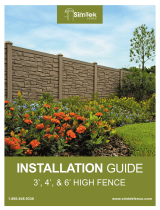Page is loading ...

READY-TO-ASSEMBLE FENCE AND GATE
INSTALLATION MANUAL
1. Layout and Planning
1.1. First stake out the area and run strings around as shown in Figure 1. Gates need to
be located on level ground.
1.2. Proceed to dig post holes approximately 3” to 4” wider than the gate on centers. See
Figure 2 for post hole depth.
2. Post Installation
2.1. Use a rubber mallet to drive the post caps onto the posts. Be careful not to damage
the post or caps. See Figure 3.
2.2. For a single gate installation set the gate opening 1”wider than the actual width gate.
(See Figure 4 on Next Page.) ALWAYS MEASURE Gate Frame to determine
actual width of gate.
2.3. For a double drive gate installation set the gate opening 2” wider than the actual
width of the two gates. (See Figure 5 on Next Page.) ALWAYS MEASURE Gate
Frame to determine actual width of gate.
2.4. Fill the post hole with a stiff concrete mix being sure that the concrete extends below
the
bottom of the post.
2.5. Be sure the posts are plumb and the fence slots are facing the correct direction while
the
concrete is setting. Brace the posts as necessary while the concrete is setting.

3. Gate Installation
3.1. After the concrete for the post has set the gate may be hung. Place the gate on blocks
at the correct elevation (See Figure 2.)
3.2. Locate the hinges as far apart as possible on the gate and clamp the hinge post leaf to
the post. Verify that the hinge post leaf is completely flush and plumb with the
mounting surface, to avoid binding. Note the direction the gate will open. See
Figure 6.
3.3. Attach the hinges to the post by drilling 7/64” pilot holes and fastening with screws
provided.
3.4. Center the gate into the opening and attach to the hinges in the same manner as the
posts.
3.5. If the hinge is to be mounted on a flat surface you may need to shim out the hinge
post leafs so that the hinge does not rub or bind against the mounting surface. (See
Figure 7.)
3.6. The screws provided with the hinge are intended for securing the hinge to aluminum
posts & gates. If the hinge is to be mounted to a masonry column, wood, etc., ask
your local building supply dealer to recommend the appropriate fasteners for your
mounting application.
3.7. Test gates for a smooth free swinging operation, then proceed to install the latch
hardware as needed.

4. Hinge Adjustment
4.1. To adjust hinge tension, depress the cam with a 5/16” wide tip slotted screwdriver
and turn the cam 1/4 turn, then allow the cam to rise to engage the two dimples.
Clockwise increases tension. (See Figure 8.) Tension the hinges equally.
4.2. Check with the Building Officials as to local requirements and adjust as instructed.
In the absence of any local regulations, gates surrounding a pool or other similar
risk should be adjusted so gate can be opened 4”, released, and the gate will latch
securely. Repeat 5 times. Note: you must use a low friction type latch to meet this
requirement. (EX. The Protector Latch or Magna Latch)

5. Drop Rods
5.1. Mount a drop rod guide two (2) inches from the bottom of the gate by drilling two
(2) 7/64” holes and fastening the guide with two (2) # 6 x 1/2” self-tapping
screws. Fasten the drop rod catch 20 inches above the bottom of the gate in the
same fashion as the guide. Before fastening the catch, use the drop rod to align the
guide and catch. See Figure 9.
6. Regular Maintenance
6.1. Check for proper gate operation daily. Lubricate or adjust if necessary.
6.2. Keep gate and fence area free of debris and climbable objects.
6.3. Check fasteners for tightness and replace any worn or damaged parts.
/








